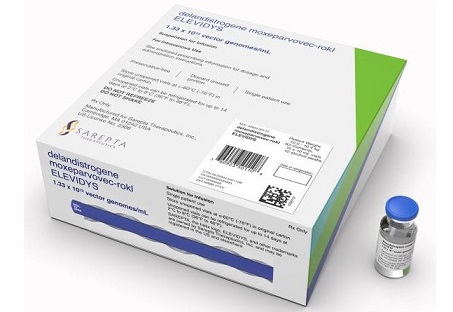U.S. FDA Accelerated Approval Of Sarepta Therapeutics’ Gene Drug Elevidys For Duchenne Muscular Dystrophy Being Questioned!
Nikhil Prasad Fact checked by:Thailand Medical News Team May 06, 2024 11 months, 2 weeks, 6 days, 19 hours, 40 minutes ago
Pharma News: In the realm of drug development and regulatory approval, the decision-making process is often complex, balancing the urgent need for effective treatments with the necessity of robust clinical evidence. One recent case that has sparked significant discussion and scrutiny is the U.S. Food and Drug Administration’s (FDA) accelerated approval of Elevidys, a gene therapy developed by Sarepta Therapeutics for Duchenne muscular dystrophy (DMD). This approval, granted in June 2023, has raised questions about the efficacy, regulatory standards, pricing, and overall impact of such decisions on patient care and the healthcare system.
 U.S. FDA Accelerated Approval Of Sarepta Therapeutics’ Gene Drug
U.S. FDA Accelerated Approval Of Sarepta Therapeutics’ Gene Drug
Elevidys For Duchenne Muscular Dystrophy Being Questioned
Understanding Duchenne Muscular Dystrophy and Elevidys
Duchenne muscular dystrophy is a rare, X-linked neuromuscular disorder caused by mutations in the dystrophin gene (DMD). This genetic alteration results in a dysfunctional dystrophin protein, leading to progressive muscle weakness and loss of function. It primarily affects young boys, with symptoms typically appearing in early childhood and progressing to severe disability and life-threatening complications.
Elevidys, developed by Sarepta Therapeutics, represents a potential breakthrough in DMD treatment. It operates by delivering functional copies of the dystrophin gene to patients’ muscles, aiming to restore dystrophin production and improve muscle function. The therapy targets a critical unmet medical need, as current treatments for DMD focus on managing symptoms rather than addressing the underlying genetic cause.
Accelerated Approval: Rationale and Controversy
The FDA’s accelerated approval pathway is designed to expedite the availability of treatments for serious or life-threatening conditions based on surrogate endpoints reasonably likely to predict clinical benefit. In the case of Elevidys, the FDA justified its decision based on increased levels of micro-dystrophin, a surrogate marker believed to correlate with clinical improvement in young DMD patients.
https://investorrelations.sarepta.com/news-releases/news-release-details/sarepta-therapeutics-announces-fda-approval-elevidys-first-gene
However, the accelerated approval of Elevidys has faced substantial criticism. One key point of contention is the therapy’s failure to meet its primary efficacy endpoint in clinical trials. Despite falling short in demonstrating significant functional improvements compared to placebo, Elevidys received accelerated approval based on surrogate markers, raising concerns about the reliability and relevance of these endpoints in predicting meaningful clinical outcomes.
https://jamanetwork.com/journals/jama/article-abstract/2818205
Advisory Committee Review and Post-Marketing Challenges
Before grantin
g accelerated approval, the FDA convened an advisory committee to evaluate Elevidys. While some panelists supported the therapy's approval, others expressed reservations about its efficacy and the adequacy of available data.
https://www.fda.gov/media/168021/download
Sarepta subsequently conducted a Phase III study, EMBARK, intended to validate Elevidys' clinical benefits. However, EMBARK also failed to meet its primary endpoint of improving functional mobility, underscoring ongoing uncertainties about the therapy's true efficacy.
https://www.cgtlive.com/view/elevidys-study-fails-primary-endpoint-dmd-secondary-endpoints-statistically-significant
The post-marketing landscape for Elevidys presents additional challenges. Ongoing evaluations are essential to assess the therapy's long-term safety, efficacy, and real-world effectiveness. Monitoring patient outcomes, adverse events, and potential off-target effects will be critical in refining our understanding of Elevidys' benefits and limitations.
Pricing Considerations and Access Challenges
Beyond clinical efficacy and regulatory decisions, the pricing of Elevidys has stirred significant debate online and in many
Pharma News coverages.
https://www.barrons.com/articles/sarepta-therapeutics-stock-price-gene-therapy-fda-c05267a0
https://www.bioworld.com/articles/698267-sarepta-sets-a-32m-price-tag-for-elevidys?v=preview
https://edition.cnn.com/2023/06/22/health/fda-sarepta-muscular-dystrophy/index.html
Priced at $3.1 million per dose, Elevidys ranks among the world’s most expensive therapies. This pricing strategy raises questions about affordability, equitable access, and the sustainability of healthcare systems, particularly concerning rare and high-cost treatments.
Broader Implications and Future Directions
The Elevidys case serves as a microcosm of broader challenges facing drug development, regulatory approval, and healthcare delivery. It highlights the tension between accelerating access to innovative therapies and ensuring robust evidence of their clinical benefits. Balancing scientific innovation, regulatory standards, patient needs, and economic considerations remains a complex and ongoing endeavor.
Looking ahead, several key areas merit attention:
-Regulatory Standards: The Elevidys case prompts a reexamination of regulatory standards for accelerated approvals, emphasizing the importance of rigorous evidence and meaningful clinical endpoints.
-Surrogate Endpoints: The reliability and validity of surrogate endpoints in predicting clinical benefit warrant continued scrutiny and refinement to enhance their utility in decision-making.
-Post-Marketing Surveillance: Long-term monitoring and evaluation of Elevidys' real-world outcomes are crucial to inform clinical practice, patient care, and future regulatory decisions.
-Pricing and Access: Addressing affordability, reimbursement models, and access barriers is essential to ensure equitable access to innovative therapies while maintaining healthcare system sustainability.
Conclusion: Toward Informed Decision-Making
The Elevidys saga underscores the complexity and nuances inherent in drug development, regulatory pathways, and healthcare policy. It underscores the need for collaborative efforts among stakeholders, including regulators, industry, healthcare providers, patients, and payers, to navigate these challenges effectively.
As the Elevidys story continues to unfold, it serves as a poignant reminder of the delicate balance between scientific advancement, patient-centric care, regulatory oversight, and economic considerations in shaping the future of healthcare. Through thoughtful dialogue, evidence-based decision-making, and a shared commitment to improving patient outcomes, we can strive towards a more informed, equitable, and sustainable healthcare ecosystem.
For the latest
Pharma News, keep on logging to Thailand Medical News.
